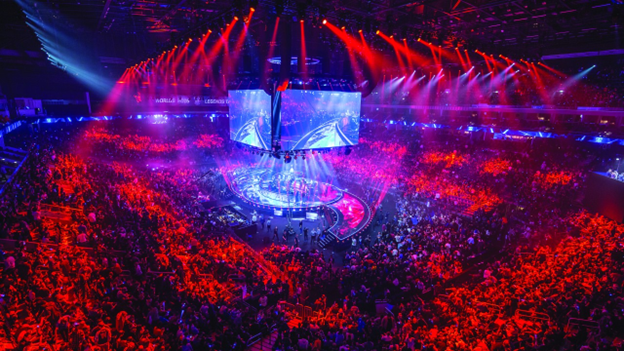
In the grand tapestry of human competition, sports have always held a prominent place, a testament to our collective love for challenge and triumph. Yet, as the digital world converges with traditional pastimes, a new contender has emerged: eSports. This burgeoning phenomenon represents more than just a series of virtual battles; it is a redefining force in the world of sports. To understand this evolution is to appreciate not only the rise of eSports but also the broader implications for athletes, fans, and cultures worldwide. As with all forms of sports and betting, responsible engagement is crucial, with resources like RG providing guidance for maintaining a balanced approach.
1. The Genesis of eSports
To fully understand the significance of eSports, one must explore its origins. Competitive gaming is not a new concept; it dates back to the arcade era of the 1970s and 1980s. However, the seeds of modern eSports were planted in the late 1990s and early 2000s, with the advent of internet connectivity and the proliferation of personal computers. In the realm of betting, a Betting Comparison offers insights into how different platforms approach eSports wagering.
a. Early Competitions and Growth
The first major eSports competitions were simple affairs, often local tournaments held in community centers or gaming cafes. As internet technology improved, these competitions expanded, allowing players from different regions and countries to compete against each other. Titles like "StarCraft" and "Counter-Strike" became pioneers, fostering communities that transcended national borders.
b. The Role of Technology
Technological advancements played a pivotal role in the rapid growth of eSports. High-speed internet and powerful computers enabled seamless online play, while platforms like Twitch and YouTube provided a stage for broadcasting competitions to a global audience. This accessibility and visibility were crucial in transforming eSports from a niche hobby into a mainstream phenomenon.
2. The Structure of eSports
Today, eSports is a complex and organized industry, with structures reminiscent of traditional sports. It encompasses a wide variety of games, each with its own community, tournaments, and professional players.
a. Popular Games and Genres
eSports covers numerous game genres, including multiplayer online battle arenas (MOBAs) like "League of Legends" and "Dota 2," first-person shooters (FPS) like "Call of Duty" and "Overwatch," and real-time strategy (RTS) games like "StarCraft II." Each game has its own professional leagues, teams, and fan bases, contributing to the diversity and richness of the eSports landscape.
b. Professional Leagues and Tournaments
Professional eSports leagues operate similarly to traditional sports leagues, with regular seasons, playoffs, and world championships. Iconic events like "The International" for "Dota 2" and the "League of Legends World Championship" draw millions of viewers worldwide, offering substantial prize pools that rival those of conventional sports.
3. The Economic Impact of eSports
The economic implications of eSports are significant, with the industry generating billions of dollars in revenue annually. This growth is fueled by various factors, including sponsorships, media rights, merchandise sales, and advertising.
a. Sponsorships and Advertising
Corporations from diverse sectors have recognized the potential of eSports, investing heavily in sponsorships and advertising. Brands such as Intel, Red Bull, and Nike sponsor teams and events, seeking to tap into the young, tech-savvy audience that eSports attracts.
b. Media and Broadcasting Rights
The demand for eSports content has led to lucrative media deals, with platforms like Twitch and YouTube competing for broadcasting rights. Traditional media outlets have also entered the fray, with networks like ESPN and BBC covering major eSports events and highlighting their growing cultural significance.
4. The Cultural Influence of eSports
Beyond its economic impact, eSports has a profound cultural influence, reshaping perceptions of sports and competition.
a. Changing the Definition of Athletes
eSports challenges traditional notions of what it means to be an athlete. Professional eSports players, or "cyber athletes," train rigorously, often dedicating hours each day to practice and strategy. This dedication has earned them recognition akin to that of athletes in physical sports, pushing boundaries and breaking stereotypes.
b. Community and Connectivity
eSports fosters a sense of community and connectivity, uniting people with shared interests across the globe. Fans engage with their favorite teams and players through social media, forums, and live streams, forming tight-knit communities that celebrate the competitive spirit.
5. Responsible Engagement in eSports
As eSports continues to grow, it is essential to emphasize responsible engagement, particularly in the context of betting, which has become increasingly prevalent.
a. The Importance of Responsible Betting
Betting on eSports matches has gained popularity, paralleling trends in traditional sports betting. However, it is crucial to approach this activity with caution. Responsible gambling resources, such as RG, provide valuable guidance for maintaining healthy betting habits. Setting limits, staying informed, and seeking support when needed are key components of responsible engagement.
b. Educational Initiatives
Promoting education and awareness around responsible betting is vital. Understanding the risks associated with gambling and recognizing the signs of problematic behavior can help individuals engage with eSports in a balanced and healthy manner.
6. The Future of eSports
The future of eSports is bright, with continued growth and innovation on the horizon. Technological advancements, such as virtual reality (VR) and augmented reality (AR), promise to enhance the eSports experience, offering new dimensions of immersion and interaction.
a. Expanding Opportunities
As eSports becomes more integrated into mainstream culture, opportunities for players, teams, and businesses will expand. This growth will likely lead to increased investment, improved infrastructure, and greater recognition for eSports as a legitimate and influential sport.
b. Global Reach and Accessibility
The global nature of eSports ensures its accessibility to diverse audiences, breaking down barriers of geography and language. This inclusivity is a powerful force, fostering understanding and collaboration across cultures.
Conclusion
The rise of eSports marks a transformative moment in the world of sports, challenging traditional boundaries and redefining competition. As digital competitions continue to evolve, they offer exciting opportunities for players, fans, and industries alike. However, it is essential to approach eSports with responsibility and awareness, ensuring that this dynamic and vibrant world remains a positive and enriching space for all who participate. Through responsible engagement and continued innovation, eSports can continue to thrive, shaping the future of sports in profound and unexpected ways.







